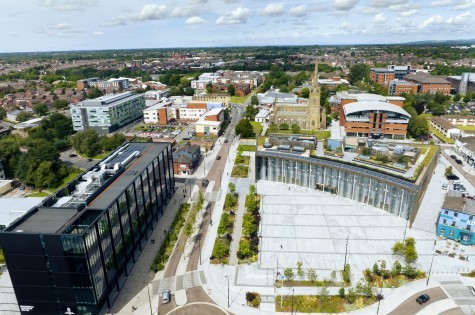With smartphones and tablets accounting for around 60% of Google searches, user location has become an important factor in how the search engine giant presents its results.
A growing number of users are seeking out businesses in their area, and Google is serving this demand. After all, neither a restaurant, a plumber nor an estate agent 100 miles away are as helpful as one within the same town or city.
Local SEO presents a fresh set of challenges and demands and a new way of approaching SEO, but it can also be hugely rewarding. Why advertise to the entire nation when a vast majority of people are out of your reach?
By targeting the customers in your area, you can reduce your outlay while also greatly improving your conversion rates.
What is a local search?
Google’s search results vary from country to country. What a user in England sees when they enter a keyword or phrase is different from what a user in the USA will see.
And when it comes to businesses, Google gets even more granular, showing results from that user’s town, city or region.
This happens when the user explicitly asks for local results – such as “plumber in Lancashire”, or “plumber near me” – as well as when Google feels that local listings would be most useful. For example, if a user simply searches for a plumber, even if they don’t specify that the plumber needs to be in the local area, Google understands that a nearby plumber would be of much more use.
When a user searches for a business, they will see a map with local options, followed by the more traditional listings of ranked websites.
This has created a second algorithm, which runs side-by-side with the original. The original algorithm ranks websites on how relevant to the search query (plus additional factors, which we’ll get to later.)
The second algorithm uses different criteria, including location, which requires its own SEO work.
Depending on how your SEO has been set up, you may appear at the top of local results, or the traditional results. Or, ideally, both.
Does my business need local SEO?
If you operate entirely online, and you can deliver your products and services to anywhere in the country, then local SEO might not help your business.
But for any business serving a local market – whether that’s eat in or takeaway food, skilled trades, or professional services such as accounting, law or estate agents – then a local SEO campaign can vastly improve your visibility and drive up demand.
Even if you have multiple locations – perhaps you have offices in various towns and cities, or even around the country – you should use local SEO techniques to promote each branch. Remember, your competitors’ offices will be using local SEO, and it’s important for you to be visible in the same places that they are.
How does local SEO work?
Google’s main results rank websites on a range of factors, including how relevant they are to the search query, the quality of the content and the usability of the website. We’ve written more about that here and here.
Google’s map-based results also rank based on how relevant a business is to the search query. But then it also takes into account how close it is to the user’s current location, and how well-reviewed it is.
Local SEO places emphasis on establishing an organisation’s reputation within its local community.
Five steps to local SEO success
1. Fill out your Google Business Profile
Google operates a free-of-charge business directory, which plays a central role in its search rankings. The business profile holds information such as contact details, opening hours, photos and videos, user reviews, updates and much more.
The more time and effort you put into maintaining your Google Business Profile, the more likely you are to rank highly in Google searches, and the more rewarding you will find the endeavour.
We have written more about Google Business Profiles here.
2. Ensure your location is included in your website’s SEO
When populating your website with content, both the site copy and any blogs or news pages you have, make sure that location is built in. Include your contact details, talk about your area, use keywords and phrases that are particular to your region.
Leave it in no doubt that you’re here to serve customers in your local area.
And if you operate offices in more than one location, ensure each has its own landing page and relevant content.
3. Establish your NAP
Integral to your business listing are your business name, address and phone number (NAP).
You’ll enter these into your Google Business Profile, but to ensure that you are a legitimate entity, Google will also look to see if these details match listings on third party websites, too.
If you’re not listed on other websites, or you are, but there’s discrepancies in your contact information, it will raise questions about your authenticity.
So submit (and update) your details across social media profiles, local business groups, trade directories, review sites and more.
4. Gather user reviews
On the topic of review sites, Google knows that it’s not enough for a business to be near a customer, the business also needs to provide a good service.
Google collects user reviews from your business profile, but will also analyse reviews from third-party sites too, such as Facebook, or TrustPilot and TripAdvisor.
The better your combined score, the more highly you can rank.
It pays to be proactive in asking your customers to provide reviews on these sites if they have enjoyed interacting with you.
5. Always do what’s best for your customers
If Google’s ever-evolving and sometimes secretive algorithms seem daunting, remember that you can go a long way to search engine success just by running a business that exists to serve its customers.
Post useful, engaging content on your website, and people will want to read it. Potential customers are more likely to approach you if you make it straightforward to find out where you are, when you’re open and how they can contact you. And if you provide a stellar service, people will want to post glowing reviews about you.
And for everything else, seoBusiness is here for you. We have more than a quarter of a century of experience in SEO and local SEO. Give us a call to find out how we can help you achieve your business goals.
Enjoyed this? Read more from seoBusiness





















